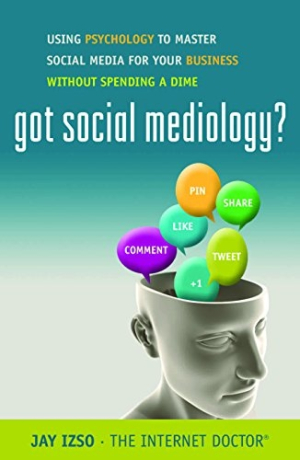Got Social Mediology?
Using Psychology to Master Social Media for Your Business without Spending a Dime
Izso offers smart advice to small-business owners who want to understand and apply the psychology of social media.
The key difference between Jay Izso’s book, Got Social Mediology? Using Psychology to Master Social Media for Your Business without Spending a Dime, and the multitude of others written about using social media for business is the author’s focus on psychology. Both an experimental psychologist and a social media maven, Izso digs below the surface of social media to demonstrate its power and its pull, writing in nontechnical terms any reader can understand.
Izso outlines and debunks common social media myths and provides an excellent overview of social media in general. He then covers the “big three” in social media, LinkedIn, Facebook, and Twitter, offering pertinent suggestions for how to make the best business use of each one. Izso is particularly tuned in to LinkedIn, indicating it is a valuable professional network that should be first on any business user’s social media list.
Readers will find comfort in the author’s broad knowledge and his straight talk. Rather than paint a falsely rosy picture of Facebook, for example, Izso explains why a Facebook personal page offers far more value to a small business than a business page. Similarly, he provides an objective assessment of the pros and cons of Twitter. Also included are useful overviews of Google+, Pinterest, and YouTube.
Business owners who wonder about whether social media is worth the effort will surely appreciate the chapter “Social Media: ROI or ROLie?” Here, the reader will find a fine summary of the potential value of each social media channel, as well as a meaningful discussion of “the invisible impact” of social media. Izso’s “Social Media Daily Checklist” should prove especially helpful to those who want an easy plan for managing the time spent on social media.
This is a book that makes a legitimate business argument for using social media—but it also presents an unbiased perspective on the pitfalls of employing social media without a commitment to understanding its psychological aspects.
Reviewed by
Barry Silverstein
Disclosure: This article is not an endorsement, but a review. The publisher of this book provided free copies of the book to have their book reviewed by a professional reviewer. No fee was paid by the publisher for this review. Foreword Reviews only recommends books that we love. Foreword Magazine, Inc. is disclosing this in accordance with the Federal Trade Commission’s 16 CFR, Part 255.

